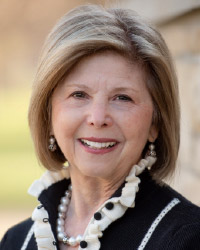
Hall Center in Wichita
Each year we look forward to sharing exciting scholarship with our neighbors in Wichita. Held at the Wichita Art Museum, this event merges scholars and community members from Lawrence and Wichita for a reception and lecture on topics in the humanities.
Diana Carlin
THU, APR 9
Reception: 6:00 - 7:00 PM | Lecture: 7:00 - 8:30 M
Wichita Art Museum, 1400 Museum Blvd
To attend the reception from 6:00 - 7:00 PM, please RSVP here
 Drawing from her book Remember the First Ladies: The Legacies of America’s History-Making Women, Diana Carlin discusses the evolving role of the first lady and its historic importance to the American presidency. Carlin shines a light on the influential women who broke barriers and made a mark on the nation, examining both the development of the role and the legacies first ladies have left behind. She explores how first ladies have influenced American society, public policy, political campaigns, major speeches, diplomacy, and daily life within the White House, from Martha Washington through Dr. Jill Biden.
Drawing from her book Remember the First Ladies: The Legacies of America’s History-Making Women, Diana Carlin discusses the evolving role of the first lady and its historic importance to the American presidency. Carlin shines a light on the influential women who broke barriers and made a mark on the nation, examining both the development of the role and the legacies first ladies have left behind. She explores how first ladies have influenced American society, public policy, political campaigns, major speeches, diplomacy, and daily life within the White House, from Martha Washington through Dr. Jill Biden.
Carlin is a retired professor of communication studies at the University of Kansas and former dean of KU’s Graduate School and International Programs. She is a co-author of U.S. First Ladies: Making History and Leaving Legacies and a founding member of the First Ladies Association for Research and Education.